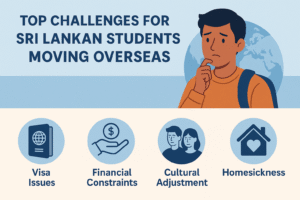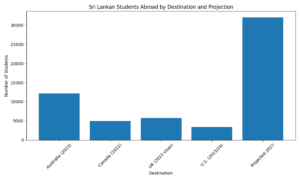
Aspiring scholars in Sri Lanka often dream of pursuing their studies abroad. With limited university seats at home, ongoing economic challenges, and the promise of high‑quality education, more students than ever are looking overseas. Over the past five years, Australia, Canada, the UK, and the United States have all seen sharp increases in Sri Lankan enrolments. Projections suggest that the total number of Sri Lankan students abroad could exceed 32,000 by 2027. Behind these statistics are real students who must navigate financial constraints, complex immigration regulations, cultural shocks, and the recognition of their credentials. This guide examines the major challenges and how effective planning can facilitate a smoother process.
Why Sri Lankans Choose to Study Abroad
Limited Capacity at Home
Sri Lanka’s higher-education system has only a few public universities, leaving many qualified students without a place to study. The University Grants Commission’s quota system means access is limited, and competition is fierce. Even with private universities, the total capacity still falls short of demand, prompting many students to seek opportunities abroad.
Economic and Social Push Factors
A long‑standing economic crisis has eroded job prospects and living standards, pushing many graduates to consider emigration. Surveys show that nearly half of degree holders and A‑level graduates would leave the country if they could. The collapse of the currency has made it difficult to fund overseas studies, yet many students see no alternative to achieving a brighter future.
Attraction of Quality and Mobility
Overseas programs promise world‑class facilities, broader career choices, and clear paths to post-study work or residency. Many countries allow international students to work during and after their studies, which helps offset high tuition costs. Scholarships and transnational education programs also allow students to start courses in Sri Lanka and finish abroad.
Financial Hurdles and Cost of Living
The cost of studying overseas is the biggest challenge. Undergraduate fees in the UK can range from £15,000 to £40,000 per year, with living expenses adding thousands more. In Canada, tuition averages between CAD 20,000 and 30,000, plus living costs of at least CAD 15,000 per year. Australia’s tuition fees range from AUD 20,000 to 45,000, and living expenses are significant as well. These costs often exceed what many families can afford.
Beyond tuition and rent, students must pay for visas, insurance, transport, and emergency funds. Students relocating to Colombo before departure need money for accommodations, exam preparation, and travel documents. Without careful budgeting, financial stress can impact health and academic performance.
Tips to Manage Finances
- Start saving early: Begin planning at least a year and consider part-time work or sponsorships.
- Research scholarships: Look for scholarships and grants specifically designed for Sri Lankan students.
- Budget carefully: Account for visa fees, insurance, textbooks, clothing, and emergency funds.
- Use reliable money transfers: Choose regulated services to ensure timely and secure transfers.
Visa Policies and Immigration Barriers
Immigration rules have tightened in many countries, making it harder to obtain study permits.
United Kingdom
The UK remains a top destination, but recent rule changes have introduced uncertainty. Dependants are restricted, financial requirements are higher, and applications have decreased. Students must secure jobs with salaries above £36,000–40,000 to remain in the country under the post-study work route, which can be challenging.
Canada
Canada has long been welcoming, but new caps on study permits and changes to post‑graduation work rights have reduced opportunities. Applications are down, approval rates have fallen, and processing times are longer, making it more difficult for Sri Lankans to secure a study permit.
Australia and New Zealand
Australia offers generous post‑study work rights, but high tuition and living costs can be a barrier. New Zealand offers a three-year post-study work visa, but it requires strong English and academic scores. Following changes in UK immigration policy, New Zealand has become increasingly popular among master’s students.
Emerging European Destinations
Countries like Finland, the Netherlands, Ireland, and Sweden have become attractive alternatives. They offer affordable tuition and quality education, with less competition for visas. Students should be prepared for new languages, climates, and cultural norms.
Cultural and Academic Adjustment
Moving from Sri Lanka to a foreign city can be overwhelming. Students encounter different teaching methods, social customs, and climates, often while juggling part‑time jobs. Many people underestimate the cost of living and workload, which can lead to stress and disappointment. Language barriers, discrimination, and homesickness are also common.
Strategies for Successful Adaptation
- Prepare academically: Attend orientation programs and improve your academic English before you go.
- Build a support network: Join student associations and connect with alums or mentors abroad.
- Respect cultural differences: Learn about local customs and laws to avoid misunderstandings.
- Seek help early: Utilize university counseling, writing centers, and academic support services.
Mental Health and Well‑Being
Studying abroad can be an isolating and stressful experience. Financial worries, cultural differences, and academic pressure may lead to anxiety or depression. Staying connected to family and friends, sticking to routines, and practicing self‑care can help. Many universities offer free or low‑cost counselling and support groups.
Self‑Care Tips
- Keep a routine: Get enough sleep, eat balanced meals, and exercise regularly.
- Practice mindfulness: Yoga, meditation, or quiet time can reduce stress.
- Seek professional help: Don’t hesitate to see a counsellor or join a support group when needed.
- Get involved: Joining clubs or volunteering can build friendships and ease loneliness.
Logistics and Relocation Tips
Organizing travel and accommodation can be stressful. Here are some steps to make your move smoother:
Pre‑Departure Checklist
- Plan: Book your flight and apply for visas well in advance to avoid last-minute stress.
- Arrange housing: Research dorms, homestays, or shared apartments, and plan for temporary lodging when you arrive.
- Organize documents: Carry multiple copies of your passport, acceptance letter, transcripts, and health records.
- Know baggage rules: Airlines have strict limits—pack smart or ship extra luggage.
- Get travel insurance: Protect yourself against medical costs, accidents, or lost belongings.
Students heading from rural areas to Colombo face similar challenges, including finding short-term housing and navigating complex paperwork, and seeking advice from those who have already made the move can be invaluable.
The Role of Credential Evaluation
To avoid delays and rejection in admissions and professional licensure, Sri Lankan students must have their credentials evaluated. Foreign institutions and employers need to understand your qualifications and how they match local standards. Credential evaluation agencies such as World Education Services (WES), International Education Research Foundation (IERF), and Educational Credential Evaluators (ECE) provide this service.
Steps for Students
- Check accreditation: Ensure your institution and program are recognized by the University Grants Commission.
- Collect original documents: Gather degree certificates, transcripts, and course descriptions. Photocopies are often not accepted.
- Translate documents: If your records are in Sinhala or Tamil, have them translated by certified translators.
- Attest your credentials: Use the Ministry of Foreign Affairs for official verification before sending documents overseas.
- Select an agency: Confirm which evaluators your target institutions accept and choose the corresponding report format.
- Submit and follow up: Send sealed transcripts and track your evaluation status online.
Why Evaluation Matters
- Admissions decisions: Universities rely on evaluation reports to judge your eligibility.
- Professional licensing: Accredited programs are key to obtaining engineering, medical, or accounting licences abroad.
- Employment and immigration: Employers and visa authorities trust official evaluation reports as proof of qualification.
Tips for a Smooth Transition
- Start early: Plan your journey six to twelve months in advance.
- Budget wisely: Include all costs and seek financial help where possible.
- Stay informed: Immigration policies change frequently—follow reliable updates for the most accurate information.
- Developing soft skills: Communication, time management, and resilience, is essential for success abroad.
- Organize documents: Keep copies of passports, certificates, and transcripts accessible.
- Stay mentally healthy: Utilize counseling services and maintain contact with loved ones.
Let ACEI Help You Succeed
Embarking on an international education journey is rewarding but complex. ACEI Global specializes in credential evaluations for Sri Lankan students and professionals. Our team understands local qualifications and how to present them effectively to institutions and employers worldwide. By working with ACEI, you’ll demonstrate the value of your degree, meet admission requirements, and speed up your application process.
Ready to take the next step? Contact ACEI Global today for a consultation and let us help turn your education dreams into reality.

